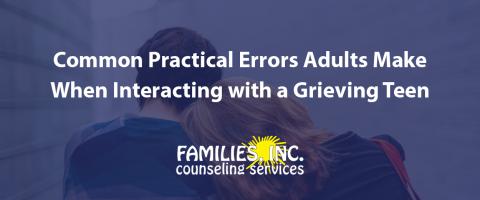
Saying, "I know how you feel"
When we tell adolescents "I know how you feel," we are actually telling them that they can't talk to us because they know that we don't know how they feel. Since grief is a unique experience for every individual, it is impossible to know exactly what another grieving person is feeling. Past experiences, plus a host of other unique dynamics in a person's life, work together to form a singular grief experience for every individual.
Putting unrealistic responsibility on the adolescent
For example, a young adolescent's father just died in a car accident. A caring adult puts his arm around the boy shortly after the funeral and says, "You have to be the man of the house now and take care of your mother and little sister." This young adolescent has just lost his father. He will usually wonder if he can care for himself, let alone his mother or younger sister. The possibility of the adolescent having to be "the man of the house" is what the adolescent doesn't need.
Saying, "If you need me, call me"
This call rarely happens and, to be frankly honest, the person who offers the help knows that in most cases they will not get a call. Many times the grieving person is so consumed by his grief he either forgets the offer or is in too much pain to call. Because of this, the "caring" adult has taken himself off the hook. Therefore, in reality, the "If you need me, call me" statement is a cop-out. It communicates to adolescents that "we really would rather not get involved unless we have to." The adolescent, like the grieving adult, can draw this conclusion rather simply; you don't want to be involved in a situation that is depressing and painful.
Minimizing the loss
"At least you still have your mother." "At least you still have other brothers and sisters." "At least you were expecting her to die." "At least he went quickly and didn't suffer." We have all too often heard these "well-meaning" statements made to grieving adolescents by "well-meaning" adults. We should never minimize the loss of a loved one to anybody. Since the adolescent is feeling very sad, the caring adult lays guilt upon the adolescent for feeling so sad. These types of statements can communicate to the adolescent that the adult has absolutely no insight as to what he or she is going through and will obviously be of no help.
The list can go on and on; however, these are the most common mistakes that we have witnessed in our experiences. Please don't beat yourself up if you have made some of these mistakes; just move forward in trying to make a positive difference in the lives of adolescents grieving the loss of a loved one.


